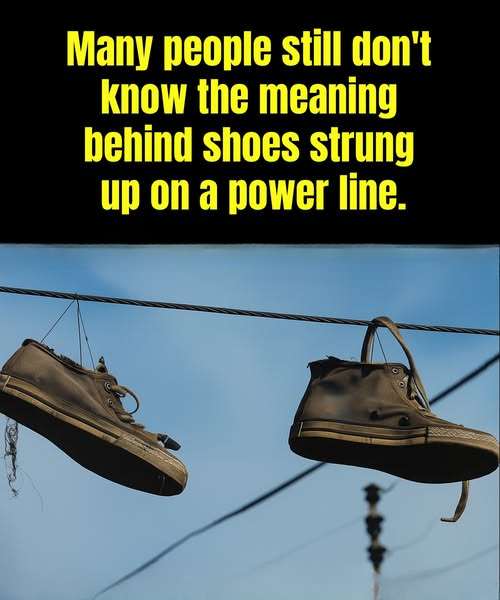Why Do People Throw Shoes Over Power Lines? The Real Stories Behind the Mystery
You’ve probably seen them before — sneakers knotted together by their laces, dangling from a power line, gently rocking in the wind above a quiet street. It’s one of those strange yet familiar sights scattered across cities and small towns alike. But what do they mean? For decades, these hanging shoes have inspired countless theories — from heartfelt rituals to urban legends.
The truth is, the reason isn’t one-size-fits-all. Depending on where you are, those airborne sneakers could represent celebration, remembrance, rebellion, or something deeply personal.
From the Battlefield to the Neighborhood
One of the oldest explanations comes from the military. Some veterans say the tradition began with soldiers who, after completing basic training or returning from deployment, tied their boots together and tossed them over power lines as a symbolic gesture. It marked the end of hardship — a quiet, personal way to say, “I made it through.”
Over time, the custom spread beyond military circles, becoming a broader symbol of survival and transformation.
In this sense, the shoes weren’t meant to send a message to others — they were simply left behind as silent markers of endurance.
The Gang and Drug Myth
Pop culture has long fueled the darker interpretation: that hanging shoes mark gang boundaries or drug-dealing spots. Movies and urban myths suggest they’re used to honor fallen members or signal danger zones.
However, police departments in major cities like Chicago and Los Angeles have repeatedly said there’s no real link between power-line shoes and criminal activity. Still, the story persists — proof that mystery often fills the gaps where truth is uncertain.
A Childhood Prank Turned Tradition
For many, the image of shoes on a wire stirs up memories of schoolyard teasing. It’s the classic prank — someone snatches a kid’s sneakers, ties the laces, and throws them onto a wire. In those moments, the shoes became a symbol of humiliation, not status.
Years later, those who see them might recall not danger or ritual, but the sting of embarrassment — a reminder of growing pains and playground hierarchies.
Late-Night Laughs and Dares
Of course, not every pair of airborne sneakers carries deep meaning. In plenty of cases, they’re the result of a spontaneous act — friends celebrating, marking a graduation, a party, or just goofing around late at night.
Sometimes, it’s no more than a dare — an impulsive, fleeting moment that leaves a lasting visual mark. For these people, the shoes aren’t statements; they’re snapshots of youth, laughter, and restless energy.
From Graffiti to Symbolism: A New Form of Street Art
In modern urban culture, the image has taken on new life as a form of expression. Artists and photographers have embraced the sight of hanging shoes as part of the city’s visual poetry — a gritty yet nostalgic symbol of identity.
In certain neighborhoods, the practice has even evolved into intentional art installations. Each pair of shoes becomes a story suspended in midair — representing people who’ve come, gone, and left their footprints behind.
Unspoken Memorials
Sometimes, though, the gesture carries deep emotion. In many communities, hanging shoes honor someone who’s passed away — especially young lives cut short. Friends or family members might toss a loved one’s shoes onto the line near a favorite hangout, creating a quiet memorial in their memory.
To outsiders, it might look like random vandalism, but to those who know the story, it’s a message of love, loss, and remembrance.
A Shared Thread
Across all these interpretations, one theme stands out: leaving something behind. Whether it’s to mark the end of a chapter, pay tribute to someone, or capture a fleeting moment of rebellion, hanging shoes represent movement and memory.
Shoes are deeply personal — they carry the wear and tear of every step someone has taken. When they’re strung up high, visible yet unreachable, they symbolize transition — caught between past and present, between the ground and the sky.
The Real-World Consequences
Of course, for city workers and utility companies, the practice is less poetic. Shoes on power lines can damage equipment, interfere with repairs, or create safety hazards. In many places, crews routinely remove them during maintenance, not out of judgment but necessity.
The Meaning Depends on the Viewer
Ultimately, the significance of those swaying sneakers depends entirely on who’s looking. To one person, they might symbolize rebellion. To another, a tribute. To most, they’re simply another thread in the fabric of urban life — a reminder that every street corner holds stories, whether we know them or not.
So next time you glance up and spot a pair of shoes dangling against the sky, take a moment to wonder. Maybe they mark celebration. Maybe they honor loss. Or maybe, they’re just someone’s carefree way of saying goodbye to an old chapter of life.
